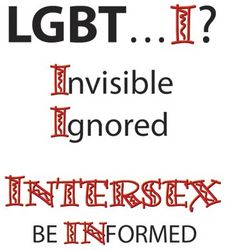
While I appreciate the highlighting of issues such as this that do get a lot of mainstream ventilation they have a way of misleading the public but showing up the arrears that need addressing.
Firstly Intersex people differ from transgender people as their status is not gender related but instead relates to their biological makeup (genetic, hormonal and physical features) which is neither exclusively male nor exclusively female, but is typical of both at once or not clearly defined as either. These features can manifest themselves in secondary sexual characteristics such as muscle mass, hair distribution, breasts and stature; primary sexual characteristics such as reproductive organs and genitalia; and/or in chromosomal structures and hormones. The term intersex has replaced the term ‘hermaphrodite’ which was used extensively by medical practitioners during the eighteenth and nineteenth centuries.
At Least 30 or 40 Different variations are known to science; 10--‐80% Of cases are idiopathic, with no exact diagnosis.
Some Common intersex variations are diagnosed prenatally, others may be apparent at birth. Some Intersex traits become apparent at puberty, or when trying to conceive, or through random chance. However, most intersex characteristics are not pathological, but express healthy variation amongst human bodies.
Inspire Jamaica a positive feature aired on CVM TV had as its latest subject baby ‘Angel’ and her mother speaking to the issues surrounding ambiguous genitalia and or intersexuality (although the word was not used in the clip not even by the doctor interviewed) and that the mother had bought male clothing and related items only to be instructed by the gynaecologist to wait whilst also asking the Registrar General Department to amend the birth papers and such to female gender.
I was a bit disturbed by that and then to be landed with the doctor’s encouragement to the mother go ahead the surgery to effectively select the baby’s gender as opposed to waiting until baby X reached possibly eighteen years of age seeing that is our age of adulthood in law; persons may not want to remain as forced on them by doctor through the mother and may have consequences in later years.
At Least 30 or 40 Different variations are known to science; 10--‐80% Of cases are idiopathic, with no exact diagnosis.
Some Common intersex variations are diagnosed prenatally, others may be apparent at birth. Some Intersex traits become apparent at puberty, or when trying to conceive, or through random chance. However, most intersex characteristics are not pathological, but express healthy variation amongst human bodies.
Inspire Jamaica a positive feature aired on CVM TV had as its latest subject baby ‘Angel’ and her mother speaking to the issues surrounding ambiguous genitalia and or intersexuality (although the word was not used in the clip not even by the doctor interviewed) and that the mother had bought male clothing and related items only to be instructed by the gynaecologist to wait whilst also asking the Registrar General Department to amend the birth papers and such to female gender.
CMV TV's video on the subject (part 1)
I was a bit disturbed by that and then to be landed with the doctor’s encouragement to the mother go ahead the surgery to effectively select the baby’s gender as opposed to waiting until baby X reached possibly eighteen years of age seeing that is our age of adulthood in law; persons may not want to remain as forced on them by doctor through the mother and may have consequences in later years.
During puberty the genitalia can change alongside genes and internal characteristics with many variations of the combinations, with regards to chromozones, gonads etc. which is why the experts should have waited. There is new information as well and the push by intersex activists as well thanks to them for my own enlightenment. The rush to gender reassignment surgery is wrong especially for cosmetic reasons and the fears of the parents; early surgery can cause issues as such persons mature futuristically is problematic. Again I am not an expert in endocrinology by there is enough information out there and that gender is not binary. We should wait until the age of majority in Jamaica legally which is 18 and let them choose while educating them.
We do not do the best for our children in this rigid way. I am waiting to see the part 2 of what the doctor actual recommended in the series and I hope he didn't recommend surgery.
Difficulties presented by the binary gender model and gender stereotypes
Negative attitudes towards trans and intersex people are directly correlated to the importance that a determinate society places on the binary gender model and the level of gender stereotypes, sexism and gender inequalities that exist within it. The binary gender model classifies both sex and gender into two distinct and exclusive forms of masculine and feminine identities. This system is maintained through a cisnormativity system which legitimises and privileges those who are comfortable in the gender belonging to the sex assigned to them at birth through various practices and institutions.
Additionally, this norm systematically disadvantages and marginalizes all persons whose sex, gender identity and gender expression do not meet social expectations. This happens through the enforcement of wide boundaries between the two sexes (and their corresponding genders) to discourage people from crossing them or establishing alternative third sexes or third genders. Gender stereotypes also play a significant role in othering and marginalizing trans and intersex people. In fact, gender stereotypes that favour a particular form of ‘masculinity’ in relation to men and a particular form of ‘femininity’ in relation to women expose many trans and intersex people to institutionalized discrimination.
also see:
More on Intersexuality 2010Caster Semenya or Buju Banton 2009

Jamaican Inter-phobia, lack of understanding Inter-sexuality 2010
A RELIGIOUS PERSPECTIVE ON THE CASTER SEMENYA ISSUE
FEMALE MASCULINITY: DISRUPTING STANDARDS OF BEAUTY AND REDEFINING WOMANHOOD
INTERSEXUALITY, AMBIGUOUS GENITALIA & PSYCHO-SOCIAL ISSUES DISCUSSION ON NATIONWIDE RADIO JAMAICA 11.09.09
Peace & tolerance
H

No comments:
Post a Comment